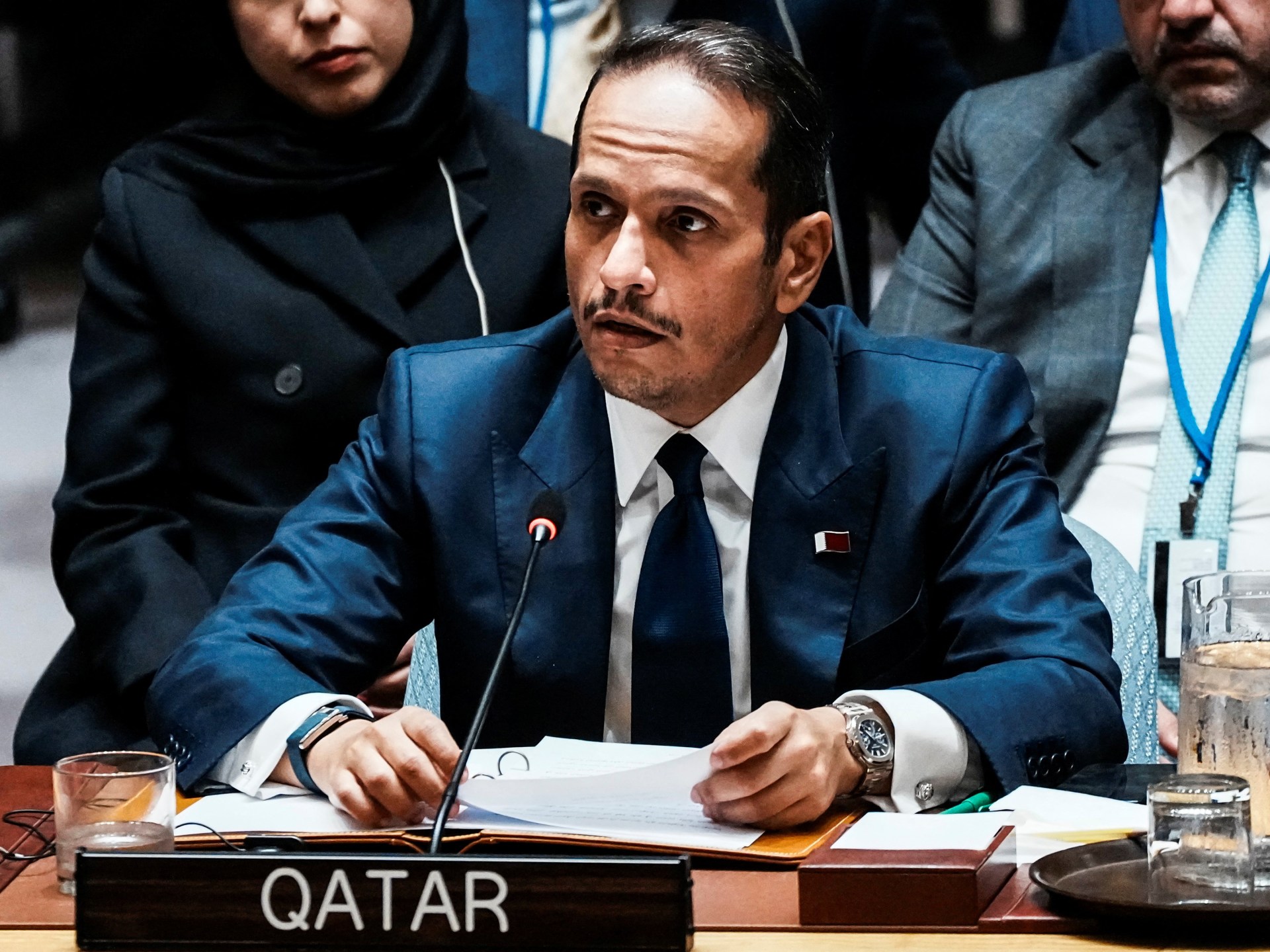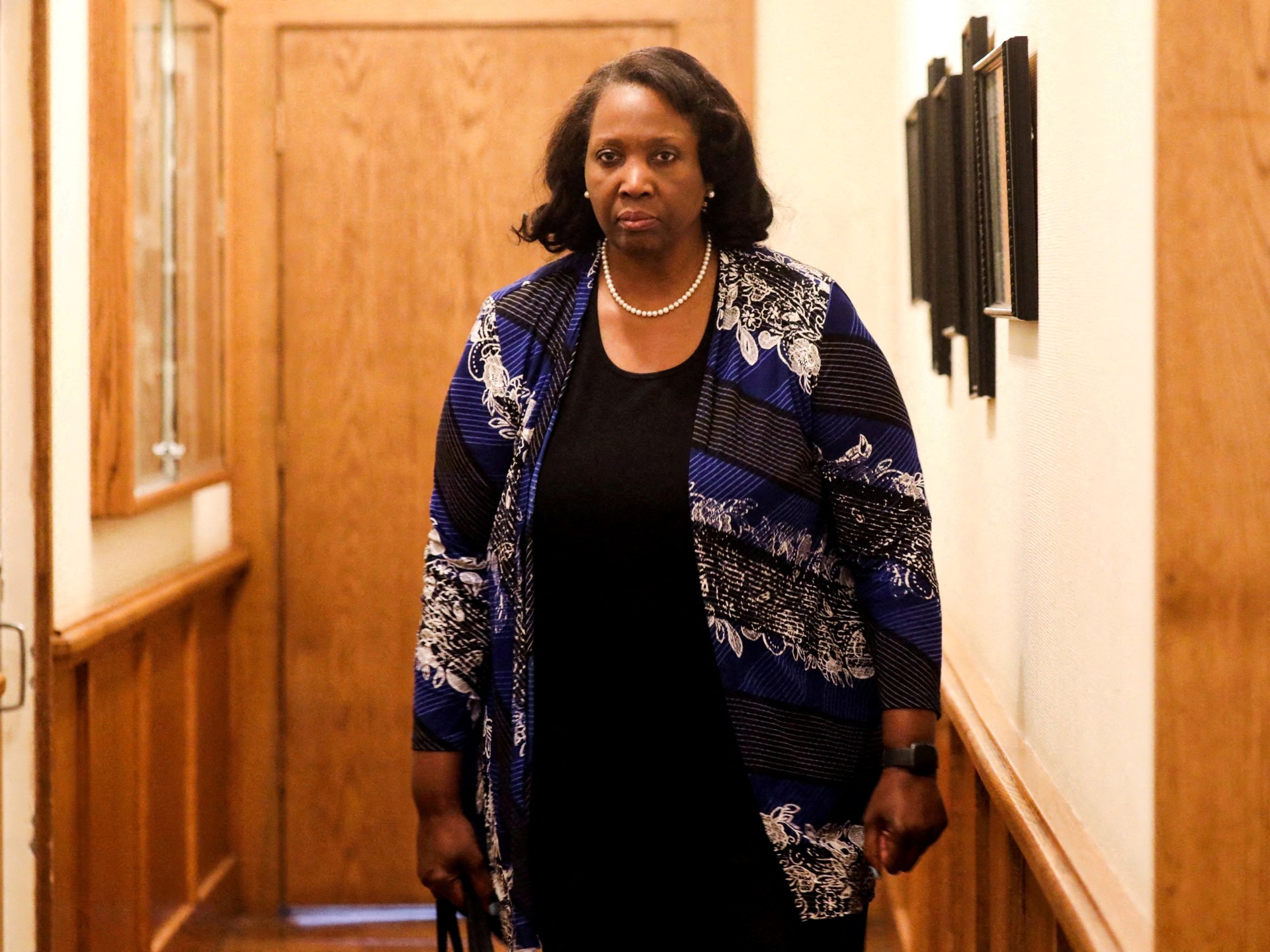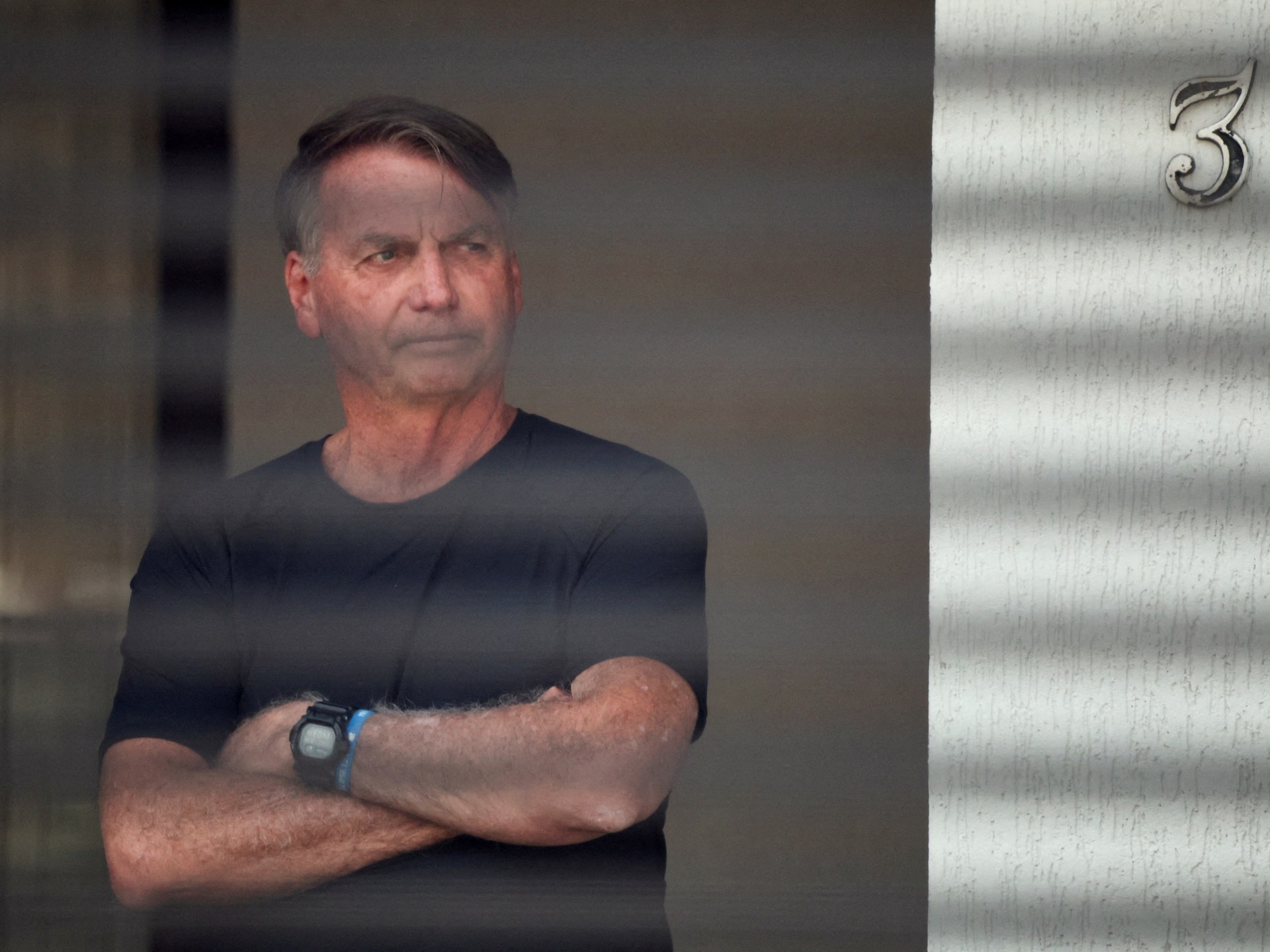LIVE: Charlie Kirk shot dead; new images of ‘person of interest’ released



The United Nations Security Council has condemned the Israeli attack on the Qatari capital Doha on Tuesday and called for de-escalation in a statement agreed by all 15 members, including Israel’s chief ally, the United States.
Council members issued the statement ahead of the emergency meeting on Thursday, which was convened to discuss Israel’s attacks targeting Hamas leaders in the Qatari capital, as it ramped up its offensive in Gaza City, forcing more than 200,000 to flee.
list of 4 itemsend of list
Five Hamas members were killed, but the Palestinian group said its leadership survived the assassination bid. A Qatari security force member was also killed in the unprecedented attack, which has sent tensions in the region skyrocketing.
Hamas leaders were meeting to discuss a new deal proposed by US President Donald Trump when the attack happened.
“Council members underscored the importance of de-escalation and expressed their solidarity with Qatar,” said the statement, drafted by France and the United Kingdom, which nonetheless stopped short of explicitly mentioning Israel.
It also emphasised that “releasing the hostages, including those killed by Hamas, and ending the war and suffering in Gaza” were “top priority”. More than 40 captives are still held in Gaza, but only 20 of them are believed to be alive.
The US, which traditionally shields its ally Israel at the United Nations, appeared to deliver a strong rebuke to Israel, reflecting President Donald Trump’s purported unhappiness with the attack.
Acting US Ambassador Dorothy Shea said: “Unilateral bombing inside Qatar, a sovereign nation working very hard and bravely taking risks alongside the United States to broker peace, does not advance Israel’s or America’s goals.”
“That said, it is inappropriate for any member to use this to question Israel’s commitment to bringing their hostages home,” she continued.
Reporting from New York, Al Jazeera’s Gabriel Elizondo said that diplomatic sources had told him the US “pushed back” against stronger language against Israel in the statement, which was nonetheless “highly significant”.
However, Shea had made it clear that “the US cannot and will not defend Israel’s attack on Qatar”.
“Clearly, the US still backs Israel. Clearly, the US will still … protect Israel in the Security Council, but this was a bridge too far for the United States,” said Elizondo.
“It will be interesting to see in the coming hours and days if we even get more clarification from the White House on this,” he added.
After Tuesday’s attack, the White House had said President Trump was not notified in advance. Upon learning of the attack, the president had allegedly asked his envoy, Steve Witkoff, to warn Qatar immediately, but the attack had already started.
The Security Council statement highlighted “support for the sovereignty and territorial integrity of Qatar”, underlining the country’s crucial role as “a key mediator” in peace talks between Israel and Hamas.
Qatari Prime Minister Sheikh Mohammed bin Abdulrahman bin Jassim Al Thani flew in from Doha for the marathon three-hour session, telling the UNSC that Doha would continue its humanitarian and diplomatic efforts, but would not tolerate further breaches of its security and sovereignty.
Blasting Israel’s leaders as “arrogant”, he said that the timing of the attacks during mediation efforts showed that the country intended to derail them. “Israel is undermining the stability of the region impetuously,” he said.
UN Under-Secretary-General for Political Affairs Rosemary DiCarlo described Qatar as a “valued partner in advancing peacemaking” and expressed concern over Israel’s recklessness, saying that the strikes represented an “alarming escalation”.
She pointed out that Israel’s war on Gaza had killed tens of thousands of people and almost completely destroyed Gaza, noting that the situation in the occupied West Bank, including occupied East Jerusalem, had “continued to spiral downward”.
She also noted Israel’s other “dangerous escalations” across the region, involving Iran, Lebanon, Syria and Yemen.
“The Israeli attack on Doha potentially opens a new and perilous chapter in this devastating conflict, seriously threatening regional peace and stability,” she said.
In other interventions, Algeria’s ambassador to the UN, Amar Bendjama, said: “Israel behaves as if law does not exist, as if borders are illusions, as if sovereignty itself is a dispensable motion, as if the UN charter is an ephemeral text.”
Noting Israel’s attacks on Syria, Lebanon, Yemen and “renowned peace broker” Qatar, he added: “This is not strength, it is recklessness. It is a sign of madness. It is the conduct of an extremist government, emboldened by immunity [and] impunity. A government driving the region and the whole world toward the abyss.”
Israel’s UN envoy, Danny Danon, said Israel carried out its strike on Hamas leaders, who had directed attacks planned in the “luxury confines of Doha”.
Danon said these were the “sole targets” of the attack, adding that they were “terrorists” rather than “legitimate politicians, diplomats, or representatives”.
Al Jazeera’s Elizondo said the prevailing sentiment at the session was that “the world clearly stands behind Qatar”.

In sport, sometimes there is no better way to prepare for a fierce rivalry than watching reruns or reading summaries of previous heart-stopping encounters.
And in cricket, there is no bigger rivalry than India vs Pakistan.
list of 2 itemsend of list
The sport’s history is embellished with historic India-Pakistan clashes at every tournament and in every decade.
With the teams set to meet again in the T20 Asia Cup 2025, Al Jazeera Sport picks the three India-Pakistan Asia Cup classics you must revisit before Sunday’s encounter:
The 2010 edition of the Asia Cup was a four-team tournament played entirely in Dambulla, Sri Lanka, where all teams played a round-robin group stage, with the top two progressing to the final.
India beat Bangladesh while Pakistan lost to Sri Lanka, making their June 19 encounter a must-win for the Shahid Afridi-led side.
Pakistan opened with a 71-run partnership between Salman Butt and Imran Farhat. A par total of 267 followed the regular fall of wickets thereafter. India’s fast-medium seamer Praveen Kumar picked up three wickets, but it was Ravindra Jadeja’s left-arm spin that kept Pakistan in check.
Gautam Gambhir and Virender Sehwag opened the batting for India’s chase, and while Sehwag fell after an uncharacteristically slow innings, Gambhir kept going as captain MS Dhoni chipped in with a half-century.
India seemed well set before Pakistan’s spinners struck in the last third of their innings. Gambhir, Rohit Sharma, Dhoni and Jadeja fell in quick succession, leaving India reeling at 219-6 with 49 runs required off 29 balls.
Lower-order batter Suresh Raina had the responsibility to take India home alongside off-spinner Harbhajan Singh. Raina hit Ajmal for 12 off 4 before three economical overs from Shoaib Akhtar and Mohammad Amir.
With eight runs to defend in the final over, Amir made a near-perfect start as Raina ran a single. In a desperate attempt to get back on strike, Raina had a mix-up with Harbhajan and was run out, giving Pakistan the upper hand. India needed seven off four, with Kumar facing Amir. A double and a single brought Harbhajan back on strike for the final two balls.
Harbhajan, who had an altercation with Akhtar a few balls earlier, swung at a length delivery, clearing midwicket for a huge six. The Turbanator then turned towards Akhtar and let out a loud roar as the Indian dressing room celebrated wildly.
India were in the final and Pakistan were nearly out.
Pakistan: 267 in 49.3 overs – Salman Butt 74 (85), Kamran Akmal 51 (41); Praveen Kumar 3-53 in 10 overs.
India: 271 in 49.5 overs – Gautam Gambhir 83 (97), MS Dhoni 56 (71); Saeed Ajmal 3-56 in 10 overs.
The round-robin format continued for the 2010 tournament in Bangladesh.
By the time India faced Pakistan, both teams had one win and one loss and needed a win to bolster their chances for a spot in the final.
Runs flowed off Rohit Sharma’s bat on a quick Mirpur outfield, and India seemed on their way to a big total despite losing Shikhar Dhawan early. Virat Kohli joined Rohit in smashing the Pakistani pacers.
While Rohit went his merry way, India were dealt a blow when Umar Gul dismissed Kohli for five. Regular wickets slowed India’s scoring rate, but they still posted 245, thanks to a late flourish by Ambati Rayudu and Jadeja.
Pakistan’s top-order, particularly Mohammad Hafeez, gave them a good start to the chase. However, it wasn’t long before India’s spin twins Ravichandran Ashwin and Amit Mishra forced a collapse worthy of Pakistani renown. Four batters were dismissed in the space of 42 runs.
Hafeez began the rebuild with Sohaib Maqsood in an 87-run partnership, but both were dismissed in consecutive overs, leaving Pakistan reeling at 203-6 off 45. Maqsood’s run out, in particular, was a gift for India after a huge mid-pitch mix-up with Shahid Afridi, just after Pakistan took the upper hand.
Afridi, the last recognised batter, was joined by Gul as Pakistan required 43 off 30 with four wickets standing. Every Afridi swing of his bat was met with trepidation as the all-rounder was known for attempting big shots irrespective of the match situation.
At first, he targeted Jadeja, hitting him for a four and a six in the 46th. The following over, from Bhuvneshwar Kumar, also brought two boundaries before Mohammad Shami kept Pakistan quiet in the 48th.
Kumar’s next over, with two wickets and just three runs, all but ended Pakistan’s hopes as Afridi watched on from the non-striker’s end.
The final over was handed to Ashwin, who had taken 2-31 in his nine overs thus far. The wily spinner gave India the perfect start by bowling Ajmal first up. Pakistani fans held their heads in disbelief while India’s celebrated wildly.
Junaid Khan was last in, and he played a perfect dab to pinch a single, bringing Afridi back on strike.
With nine needed off four, the stadium held its breath knowing Afridi could sway the match either way.
As Ashwin began his delivery stride, Afridi stepped back and swung hard at a short ball. The connection between was by no means ideal, but Afridi’s power cleared the ropes.
Afridi again gave himself room with the ball pitched closer to his body, but when has that ever stopped Afridi from playing a risky shot? Another wild swing skied the ball, but it again cleared the boundary.
Ashwin was all hands-on-head as the Indian team stood in disbelief.
Afridi was all arms lifted wide in his trademark star-man celebration as Junaid embraced him. A delighted Afridi gave Junaid a quick kiss on the cheek before the star all-rounder was mobbed by his teammates.
India: 245-8 in 50 overs – Rohit Sharma 56 (58), Ravindra Jadeja 52 (49); Saeed Ajmal 3-40 in 10 overs.
Pakistan: 249-9 in 49.4 overs – Mohammad Hafeez 75 (117), Shahid Afridi 34 (18); Ravichandran Ashwin 3-44 in 9.4 overs.

The Asia Cup 2016 was the first played as a T20 and produced one-sided group games until India met Pakistan in the fourth match of the round-robin stage.
Pakistan lost Hafeez to the fourth ball of the match.
A poor umpiring decision, with Khurram Manzoor surviving a caught-behind, left India furious. However, Dhoni’s team didn’t have to wait too long for Manzoor’s departure as Afridi’s men continued to struggle on a low-scoring pitch, losing wickets in every other over.
In a total of 83, Sarfaraz Ahmed’s 25 was Pakistan’s only saving grace. Hardik Pandya led the attack with three wickets, but each of India’s bowlers chipped in, including a then-fresh-faced Jasprit Bumrah.
The chase was seemingly simple, given India’s power-packed batting. Mohammad Amir, playing his first Asia Cup since returning to the team following his cricket corruption-linked ban, had other plans.
The left-arm pacer made a near-perfect start, striking Rohit’s toes with a swinging yorker, only for it to be adjudged not out. There was no surviving the following inswinger, which struck the pads.
Kohli was next in to face the pumped-up Amir, swinging the ball to his will. A single switched strike with Ajinkya Rahane’s first ball ending up being his last, Amir swinging the ball back into the right-hander viciously to strike his pads plumb in front.
Amir’s second over, and India’s third, brought more lbw appeals as Kohli was struck on the pads by another skilful delivery that straightened, but failed to impress the umpire. Amir had his reward next ball, as Raina was the man to go, chipping an easy catch to short mid-on.
Kohli and Yuvraj Singh saw out Amir’s spell, nudging towards the target. Kohli, in particular, showed nerves of steel to see off Amir’s scintillating swing.
The Indian batting star soon reaped his reward, however, settling in to take boundaries off all the bowlers, including Amir’s last.
India’s charge was halted in the 15th when Kohli fell on 49, followed by Pandya, but the team total was 76-3. New batter Dhoni and Yuvraj took six more deliveries to finish the job.
India won by five wickets, but the match could have had a nervy finish were it not for Kohli’s brilliance.
Pakistan: 83 runs in 17.3 overs – Sarfaraz Ahmed 25 (24); Hardik Pandya 3-8 in 3.3 overs.
India: 85-5 runs in 15.3 overs – Virat Kohli 49 (51); Mohammad Amir 3-18 in 4 overs.


The administration of United States President Donald Trump has asked an appeals court to remove Lisa Cook from the Federal Reserve’s board of governors by Monday, before the central bank’s next vote on interest rates.
The request on Thursday represents an extraordinary effort by the White House to shape the board before the Fed’s interest rate-setting committee meets next week on Tuesday and Wednesday.
list of 4 itemsend of list
At the same time, Senate Republicans are pushing to confirm Stephen Miran, Trump’s nominee to an open spot on the Fed’s board, which could happen as soon as Monday.
In a court filing on Thursday, the Department of Justice asked the US Court of Appeals for the DC Circuit to pause US District Judge Jia Cobb’s Tuesday ruling temporarily blocking Cook’s removal, pending the administration’s appeal.
Trump moved to fire Cook in late August. Cook, who denies any wrongdoing, filed a lawsuit saying Trump’s claim that she engaged in mortgage fraud before she joined the central bank did not give him legal authority to remove her, and was a pretext to fire her for her monetary policy stance.
Cobb’s ruling prevents the Fed from following through on Cook’s firing while her lawsuit moves forward.
In their emergency appeal, Trump’s lawyers argued that even if the conduct occurred before her time as governor, her alleged action “indisputably calls into question Cook’s trustworthiness and whether she can be a responsible steward of the interest rates and economy”.
The administration asked an appeals court to issue an emergency decision reversing the lower court by Monday. If their appeal is successful, Cook would be removed from the Fed’s board until her case is ultimately resolved in the courts, and she would miss next week’s meeting.
If the appeals court rules in Cook’s favour, the administration could seek an emergency ruling from the Supreme Court.
The case, which will likely end up before the US Supreme Court, has ramifications for the Fed’s ability to set interest rates without regard to politicians’ wishes, widely seen as critical to any central bank’s ability to keep inflation under control.
The Supreme Court and lower appeals courts, including the DC Circuit, have temporarily lifted several other rulings that briefly blocked Trump from firing officials at agencies that have historically been independent from the White House.
On Wednesday, however, the DC Circuit blocked Trump from firing US Copyright Office director Shira Perlmutter while she appeals a lower court’s refusal to reinstate her to the post.
Trump has demanded that the Fed cut rates immediately and aggressively, repeatedly berating Fed Chair Jerome Powell for his stewardship over monetary policy. Cook has voted with the Fed’s majority on every rate decision since she started in 2022, including on both rate hikes and rate cuts.
The law that created the Fed says governors may be removed only “for cause”, but does not define the term nor establish procedures for removal. No president has ever removed a Fed governor, and the law has never been tested in court.
Cobb on Tuesday said the public’s interest in the Fed’s independence from political coercion weighed in favour of keeping Cook at the Fed while the case continues.
She said that the best reading of the law is that a Fed governor may only be removed for misconduct while in office. The mortgage fraud claims against Cook all relate to actions she took prior to her US Senate confirmation in 2022.
Trump and William Pulte, the Federal Housing Finance Agency director appointed by the president, say Cook inaccurately described three separate properties on mortgage applications, which could have allowed her to obtain lower interest rates and tax credits.

Israeli forces have detained more than 100 Palestinians in raids on the occupied West Bank city of Tulkarem and have imposed a curfew, Al Jazeera Arabic reports, as the Israeli offensive in Gaza City has forced more than 200,000 Palestinians to flee the largest urban center in the enclave.
As reported earlier, Israel’s military has been conducting raids in Tulkarem after it said two Israeli soldiers were wounded when their vehicle was “hit by an explosive device“.
list of 4 itemsend of list
Soldiers stormed shops and cafes, detaining patrons, as well as residents in their vehicles, forcing them to march in line towards an Israeli military checkpoint, a WAFA correspondent reported.
Israeli forces launched a campaign of violence in the occupied West Bank after six people were killed in a shooting attack in occupied East Jerusalem earlier this week. Hamas’s armed wing, the Qassam Brigades, claimed responsibility for the shooting, in which both suspects were killed.
In response, Israel ordered the demolition of the homes of the two suspects, as well as sanctions on their family members and residents of their towns, Qatanna and al-Qubeiba, northwest of Jerusalem in the West Bank.
“There has been a complete siege and lockdown of these areas,” Al Jazeera’s Hamdah Salhut said on Tuesday following the shooting. “Collective punishment is in full swing in the occupied West Bank.”
Israel has launched a crackdown on the occupied West Bank since it launched its devastating war on Gaza, killing more than 1,000 Palestinians, arresting thousands, and demolishing hundreds of homes and civic infrastructure. Even before the October 7, 2023, attack inside Israel by the Hamas-led Palestinian groups, Israeli military and settler violence was at its highest in years.
Israel’s military operation has fuelled the forced displacement of more than 40,000 Palestinians.
“Israel’s deadly military operation in the occupied West Bank, unfolding in the horrific shadow of its ongoing genocide in the occupied Gaza Strip, has had catastrophic consequences for tens of thousands of displaced Palestinians who are facing a rapidly escalating crisis with no foreseeable prospects of return. Unlawful transfer of protected persons is a grave breach of the Fourth Geneva Convention and a war crime,” Erika Guevara Rosas, Amnesty International’s senior director for Research, Advocacy, Policy and Campaigns, said in a statement on June 5.
As well as the Israeli military actions against Palestinians, violence by Israeli settlers spiked during the war on Gaza. At least 1,860 incidents of settler violence in the occupied West Bank were recorded between October 7, 2023, and December 31, 2024, according to data from the United Nations Office for the Coordination of Humanitarian Affairs (OCHA).
The rise of far-right leaders to power has pushed Israel further towards right, with politicians at the highest levels, including Prime Minister Benjamin Netanyahu, openly indulging in anti-Palestinian rhetoric.
“We are going to fulfil our promise that there will be no Palestinian state. This place belongs to us,” Netanyahu reiterated at an event in Maale Adumim, an illegal Israeli settlement just east of Jerusalem.
“We are going to double the city’s population.”
All the settlements are considered illegal under international law and are considered the biggest hurdle in the resolution of the Israel-Palestinian conflict.

Former Brazilian President Jair Bolsonaro has been sentenced to 27 years and three months in prison, shortly after a majority of a Supreme Court panel voted to convict him on charges related to an attempted military coup.
On Thursday, four out of five of the justices had found Bolsonaro guilty of trying to illegally retain power after his 2022 electoral defeat to President Luiz Inacio Lula da Silva.
list of 3 itemsend of list
Justice Carmen Lucia said there was ample evidence that Bolsonaro acted “with the purpose of eroding democracy and institutions”.
A fourth judge, Justice Luiz Fux, broke with his colleagues on Wednesday and voted to acquit the 70-year-old former president of all charges.
Currently under house arrest, Bolsonaro faced up to 40 years in prison after being found guilty on five charges, including leading a “criminal organisation” to conspire to overthrow Lula.
Still, Fux’s vote could invite challenges to the ruling.
Bolsonaro has maintained he will run for president in 2026, despite Brazil’s top electoral court barring him from running in elections until 2030 for spreading unfounded claims about Brazil’s electronic voting system.
The Supreme Court also convicted seven co-conspirators, including former defence minister and Bolsonaro’s 2022 running mate Walter Braga Netto; former Defence Minister Paulo Sergio Nogueira; Bolsonaro’s former aide-de-camp Mauro Cid; his military adviser Augusto Heleno Ribeiro; former Justice Minister Anderson Torres; former naval chief Almir Garnier Santos; and ex-police officer Alexandre Ramagem.
Reporting from Brasilia, Al Jazeera’s Lucia Newman said the sentencing, which was originally scheduled for Friday, was unexpected.
“It’s extremely significant and also a surprise,” she said. “The last of the five justices gave his guilty verdict just a short time ago, and then he and the remaining four had to calculate what the sentence would be.”
“We have to keep very much in mind that this may or may not happen immediately,” she added. “Bolsonaro’s lawyers and that of the other seven co-defendants still have some legal wiggle room here.”
“Apart from that, the supporters of Bolsonaro in Congress have already submitted an amnesty law, hopefully to get Bolsonaro off the hook,” she said.
United States President Donald Trump has called his ally’s trial a “witch-hunt”, hitting Brazil with 50 percent tariffs, imposing sanctions against the presiding judge, Alexandre de Moraes, and revoking visas for most members of Brazil’s high court. Trump said on Thursday that he was very unhappy about Bolsonaro’s conviction.
In a statement, US Secretary of State Marco Rubio said the US would “respond accordingly to this witch-hunt”.
“The political persecutions by sanctioned human rights abuser Alexandre de Moraes continue, as he and others on Brazil’s supreme court have unjustly ruled to imprison former President Jair Bolsonaro,” Rubio said.
Bolsonaro, a former army captain and paratrooper, became known for his defence of Brazil’s two-decade military dictatorship after being elected to the back benches of Congress in 1990 in the early years of Brazil’s democracy.
He never hid his admiration for the military regime, which killed hundreds of Brazilians from 1964 to 1985.
In one interview, he said Brazil would only change “on the day that we break out in civil war here and do the job that the military regime didn’t do: killing 30,000”. He was referring to leftists and political opponents.
Later, he surfed on mass protests that erupted across Brazil in 2014 during the sprawling “car wash” bribery scandal that implicated hundreds of politicians – including Lula, whose conviction was later annulled.
His antiestablishment anger helped elevate him to the presidency in 2018, and dozens of far-right lawmakers were elected on his coattails, creating roadblocks to Lula’s progressive agenda.
Facing a close re-election campaign against Lula in 2022 – an election Lula went on to win – Bolsonaro’s comments took on an increasingly messianic quality, raising concerns about his willingness to accept the results.
“I have three alternatives for my future: being arrested, killed or victory,” he said in remarks to a meeting of evangelical Christian leaders in 2021. “No man on Earth will threaten me.”
Bolsonaro maintains a solid political base within Brazil, and the verdict is expected to be met with widespread unrest.